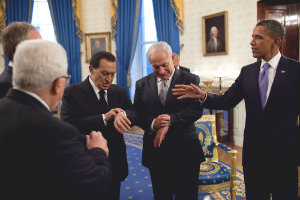Tandem Course Offers Better Understanding of Israeli-Palestinian Conflict |
| Tuesday, 30 September 2014 |
|
The two professors, Joav Toker and Mariam Habibi, decided to teach this course in tandem to help students disentangle the two sets of narratives—Jewish and Arab—that prevail in the region and better comprehend the multiplicity of perspectives. To emphasize the difference of perceptions, Habibi and Toker will each present observations and analyses based on their respective cultural backgrounds, as well as their anticipative perceptions of “the other side” and of the international community. This switching variety of perspectives will provide more insight into the complexity of this conflict. Habibi was born in Tehran and educated in the UK and France. She obtained her Ph.D. in History at Sciences Po in Paris and has taught courses on the Middle East at the American Graduate School in Paris and at several universities, including the Paris branches of Columbia and NYU. “Being raised in Iran, the discourse that I heard throughout my childhood about this conflict was very similar to that of the Arabs,” she explains. Toker is a journalist of international affairs. Born in Israel, he did his graduate studies at Columbia University in New York before moving to Paris, where he has resided for the past 20 years, serving as European correspondent for the Israeli National Television as well as covering Middle Eastern affairs for European media, notably the French TV5 Monde. This innovative approach was developed to give AGS students, who are the diplomats of tomorrow, a more comprehensive and balanced way of looking at this conflict than what is often found in national media. “The course is not about presenting the conflict as black and white and enhancing the gap between the two narratives,” Habibi explains. “On the contrary, what we would like is to bridge that gap and to open the way for exploration of possible solutions that would transcend the dialectic of one side being right and the other being wrong. For whether each narrative is true or not does not matter, because it is thought, felt to be true.” The complementarity of the two professors lies not only in their cultural backgrounds but also in their different professional approaches, Toker being a journalist and Habibi a historian. The course will use the two approaches to examine the various factors that have shaped the conflict and analyze how history has been interpreted and reinterpreted over the years. It will look at both the wars and the peace talks through the prism of each adversary as well as through the prism of the international community. It will use class discussions along with news and film analyses and will culminate in a conflict resolution simulation. “What students will be learning in class goes well beyond this particular conflict,” says Toker. “The dialectic of competing perspectives, the subtleties of the notion of identity, the long-term consequences of former imperialism and colonialism all have their analogies in other regions. This course will not only help our students to decipher what is one of the most complex conflicts in history, it also will provide them with tools to better understand the world.” This course can be taken as part of the Certificate program in Middle Eastern Studies or as part of the US-accredited Master of International Relations and Diplomacy, conducted by the American Graduate School in Paris in partnership with Arcadia University, Pennsylvania (http://www.arcadia.edu). "AGS is at the forefront when it comes to offering programming to understand the conflict in the Middle East,” said Dr. Warren Haffar, dean of International Affairs at Arcadia University. “With its faculty and guest lecturers, this new course is an incredible addition to an already strong program, one that aims to provide students with firsthand training in international relations and diplomacy." The first edition of this course runs from September to December 2014. Single sessions are open for auditing on request. (Photo credit: The White House) |
Contact Us
 Douglas Yates USA
|

 As part of its International Relations and Diplomacy graduate programs, AGS is now offering a course on the Israeli-Palestinian conflict, co-taught by two of our professors of International Affairs—one born and raised in Israel and one born and raised in Iran.
As part of its International Relations and Diplomacy graduate programs, AGS is now offering a course on the Israeli-Palestinian conflict, co-taught by two of our professors of International Affairs—one born and raised in Israel and one born and raised in Iran.
 Every day the news is filled with stories about foreign leaders, wars, peace talks, and tragedies. Our students learn how to fit together those pieces like a puzzle, and through the lens of international relations, understand the world as it is.
Every day the news is filled with stories about foreign leaders, wars, peace talks, and tragedies. Our students learn how to fit together those pieces like a puzzle, and through the lens of international relations, understand the world as it is.